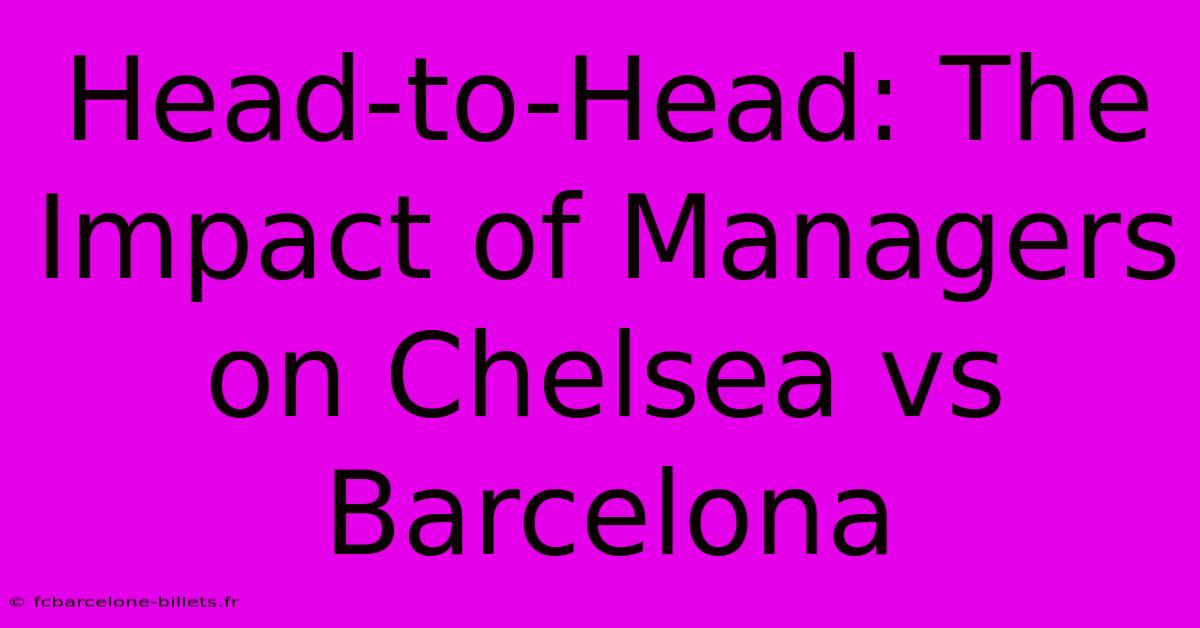Head-to-Head: The Impact Of Managers On Chelsea Vs Barcelona

Table of Contents
Head-to-Head: The Impact of Managers on Chelsea vs Barcelona
The rivalry between Chelsea and Barcelona is steeped in history, punctuated by dramatic Champions League encounters and fiercely contested transfers. But beyond the players on the pitch, the managerial influence has been profound, shaping tactics, team spirit, and ultimately, the outcome of these crucial clashes. This article delves into a head-to-head comparison, exploring how different managerial styles have impacted the fortunes of both clubs in their meetings.
The Tactical Battles: A Manager's Perspective
The managerial chess match has always been a key element in Chelsea vs Barcelona encounters. Different managers bring unique philosophies, impacting the style of play and the overall result.
Chelsea's Managerial Evolution:
-
José Mourinho's Pragmatism: Mourinho's Chelsea was known for its defensive solidity and counter-attacking prowess. His pragmatic approach, often prioritizing a strong defensive base, proved effective against Barcelona's possession-based style, although not always successful. His focus on individual battles and exploiting tactical weaknesses was a significant factor in some encounters.
-
Antonio Conte's 3-4-3 System: Conte's arrival marked a significant tactical shift. His 3-4-3 formation, emphasizing wing-backs and high pressing, presented a different challenge to Barcelona. This more attacking system aimed to disrupt Barcelona's build-up play and capitalize on turnovers. The success varied depending on the specific players available.
-
Thomas Tuchel's Flexibility: Tuchel's tenure saw Chelsea adopt a more flexible approach, capable of both high pressing and controlled possession. This adaptability allowed Chelsea to match Barcelona's tactics more effectively, sometimes mirroring their possession game and at other times frustrating them with a more direct style.
Barcelona's Managerial Consistency and Shifts:
-
Pep Guardiola's Tiki-Taka Dominance: Guardiola's Barcelona redefined possession-based football. His "tiki-taka" style, characterized by intricate passing and relentless movement, proved incredibly difficult for Chelsea to counter consistently. The sheer dominance of possession often suffocated Chelsea's attempts to attack.
-
The Post-Guardiola Era: Managers following Guardiola, like Luis Enrique and Ernesto Valverde, maintained a possession-based approach, although with slight variations in intensity and focus. The level of control and domination varied depending on the squad's overall form and individual player capabilities.
-
The Impact of Managerial Changes: Barcelona's managerial transitions, while often maintaining a possession-based philosophy, have nonetheless influenced the team's overall performance and approach against Chelsea. These changes have sometimes led to periods of adjustment and inconsistency.
Key Matches and Managerial Influence
Several key matches highlight the impact of managers on the Chelsea-Barcelona rivalry:
-
2009 Champions League Semi-Final (Mourinho vs Guardiola): This tie exemplifies the tactical battle. Mourinho's defensive approach frustrated Barcelona, although Guardiola's team eventually progressed.
-
2012 Champions League Final (Di Matteo vs Guardiola): Roberto Di Matteo's tactical masterclass, exploiting Barcelona's weaknesses, resulted in a surprising Chelsea victory.
-
More Recent Encounters (Tuchel vs Koeman/Xavi): These more recent matches showcase the evolution of both teams' styles and the ongoing adaptation required to gain an edge.
Beyond Tactics: Team Spirit and Player Motivation
A manager's role extends beyond tactics. Building team spirit, fostering competition, and motivating players to perform at their best are crucial. The psychological impact of a manager's leadership can significantly influence the outcome of these high-stakes clashes.
Conclusion: A Dynamic Rivalry
The Chelsea vs Barcelona rivalry is not simply a clash of players; it's a battle of managerial philosophies and strategies. The evolution of managerial approaches on both sides has continually shaped the narrative, demonstrating that the coach's role is as significant as the talent on the field. Analyzing these managerial influences offers valuable insight into the tactical complexities and psychological battles that define this intense footballing rivalry. The future clashes promise further intriguing tactical battles and managerial masterclasses.

Thank you for visiting our website wich cover about Head-to-Head: The Impact Of Managers On Chelsea Vs Barcelona. We hope the information provided has been useful to you. Feel free to contact us if you have any questions or need further assistance. See you next time and dont miss to bookmark.
Featured Posts
-
C Las Asturez Barcelonas Unexpected Delights
Apr 06, 2025
-
Barcelona Motel Your Wildwood Crest Coastal Getaway
Apr 06, 2025
-
Barcelona Lottery Your Ticket To Paradise
Apr 06, 2025
-
Experience The Passion Fc Barcelona Basketball Jersey
Apr 06, 2025
-
Barcelonas Beach Break Sea Temperature And Sun Report
Apr 06, 2025
